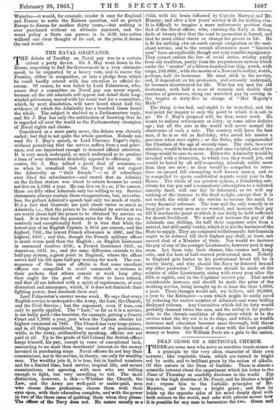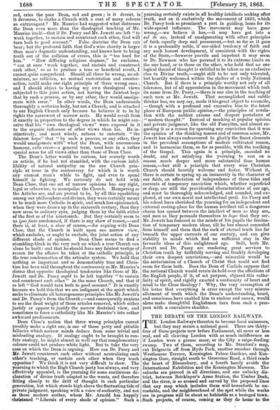DEAN CLOSE ON A. SECTIONAL CHURCH.
THERE are some men who serve as sensitive touch-stones of a principle by the very alien character of their own natures ; like vegetable blues, which are turned to bright red by acids, and to brilliant green by the action of alkalis. Of this nature is the Dean of Carlisle. There is almost a scientific interest about the experiment which his letter to the Times of Thursday so candidly discloses to the world. Dip him in the high doctrine of Dr. Pusey, and he blushes a bight red ; expose him• to the Catholic principles of Mr. Maurice, and he turns a bright green ; and then he holds up the opposite sides of his mind deeply dyed with both colours to the world, and asks with piteous accent how it is possible for any man to harmonize the two. Green and red, cries the poor Dean, red and green ; is it decent, is it decorous, to clothe a Church with a coat of many colours so extravagant ? Mr. Maurice had suggested what distresses the Dean even more than the theological teaching of Mr. Maurice itself—that if Dr. Pusey and Mr. Jowett are left " to work together, to sustain and counteract each other, God will turn both to good account." False doctrine the Dean can bear; but the profound faith that God's wise charity is larger than man's dogmatic understanding, and knows how to bring truth out of the collision of errors, this is " too hard for him." " How differing religious dogmas," he exclaims, " can at once work together, and sustain and counteract each other,' so as to produce a true or beneficial result, I cannot quite comprehend. Should all three be wrong, no ad- mixture, no collision, no mutual sustentation and counter- action, could make one right principle of three wrong ones ; and I should object to having my own theological views subjected to this joint action, not having the faintest hope that by such a process, or by any other, they would amalga- mate with error." in other words, the Dean understands thoroughly a sectarian body, but not a Church, and is attached to our English Church only because he believes it to be by rights the narrowest of narrow sects. He would revolt from it exactly in proportion to the degree in which he might con- ceive that his " own theological views" were exposed in it to the organic influence of other views than his. He in- stinctively, and most wisely, refuses to entertain " the faintest hope" that " by such a process, or any other, they would amalgamate with" what the Dean, with unconscious humour, calls error—a general term, used here in a rather special sense for all views other than those of Dean Close.
The Dean's letter would be curious, but scarcely worth an article, if he had not stumbled, with the curious infal- libility of natural antipathy on the one Church prin- ciple at issue in the controversy for which it is worth any earnest man's while to fight, and even to spend himself in fighting. We certainly do not hold with Dean Close, that one set of narrow opinions has any right, legal or otherwise, to monopolize the Church. Hampering as the Articles are, and are proved to be, by all this squabbling among our philosophers and divines, they were certainly meant to be much more Catholic in spirit, and much less opinionated, when they were drawn up in the sixteenth century, than they now seem to ordinary eyes, judging them by the faith either of the first or of the nineteenth. But they certainly seem to us ipso facto condemned, if there is any show of reason,—and there is, at least, a show of reason,—for arguing with Dean Close, that the Church is built upon one narrow view, which excludes, or ought to exclude, the joint action of any different shade of opinion. Dean Close seems to find a stumbling-block in the very rock on which a true Church can alone be built : and that he should have any faintest vestige of reason for the offence he takes at the catholic principle, is the true condemnation of the articular system. We hold that nothing so important and so demonstrably true and Chris- tian has been said throughout the controversy as Mr. Maurice's dictum that opposite theological tendencies like those of Mr. Jowett and Dr. Pusey ought to be left together " to sustain and counteract each other ' in the same Church, and that if so left " God would turn both to good account." It is exactly because we hold this that we are indignant at the spirit which seeks to eliminate all heterogeneous principles like Mr. Jewett's and Dr. Pusey's from the Church ;—and consequently anxious to see the dead weight of those articles removed, which either justify or appear to justify the narrow doctrinal view, and sometimes to force a catholicity like Mr. Maurice's into rather awkward predicaments.
Dean Close's notion that three wrong principles cannot possibly make a right one, is one of those petty and pitiable fallacies which narrow minds deduce from some trivial and misleading analogy. If analogy ought to be brought to con- fute analogy, he might almost as well say that complementary colours could not produce white light. But to take the very case on which the Dean is arguing. How can Dr. Pusey and Mr. Jewett counteract each other without neutralizing each other's teaching, or sustain each other when they teach opposites ? We think it is not very difficult to show. The yearning to which the High Church party has always, and very effectively appealed, is the yearning for some continuous de- claration of divine truth adapted to the wants, and therefore fitting closely to the drift of thought in each particular generation, but which stands high above the fluctuating tide of private judgment, speaking with a voice of authority, and not as those modern scribes, whom Mr. Arnold has happily christened " Liberals of every shade of opinion." Such a yetirning certainly exists in all healthy intellects seeking after truth, and on it exclusively the movement of 1833, which Dr. Pusey took so prominent a part in guiding, leans for its- wide-spread influence. The • movement may have gone wrong,—we believe it has,—it may have got into s- cut de sac, instead of amalgamating with other principles. of faith equally deep and permanent,—but so far as it goes- it is a profoundly noble, if one-sided tendency of faith and any such honest development, if consistent with the rights of the State,—however puerile and impotent it may seem to Dr. Newman who has pursued it to its extreme limits on the one hand, or to those on the other, who hold that no one- logical thread of thought is entitled to be taken as an exclusive- clue to Divine truth,—ought still to be not only tolerated, but heartily welcomed within the shelter of a truly National Church. But if there is a principle worthy not only of all tolerance, but of all appreciation in the movement which took its name from Dr. Pusey,—there is one also in the teaching of such men as Mr. Jowett. That accomplished and subtle thinker has, we may say, made it his great object to reconcile,. —though with a profound and excessive bias to the latest phase of European public opinion,—the principles of revela- tion with the noblest axioms and deepest postulates of " modern thought." Instead of mocking at popular opinion. and private judgment, like the old Puseyites, and almost re- garding it as a reason for spurning any conviction that it was the opinion of the thinking masses and of common sense, Mr.. Jowett has always endeavoured to glorify the finest elements in the prevalent assumptions of modern cultivated reason,. and to harmonize them, as far as possible, with the teaching of the Gospel. This again is a principle, onesided no doubt, and not satisfying the yearning to rest on a reason much deeper and more substantial than human reason,—but still a principle that every wise Christian. Church should heartily welcome and foster. Without it,. there is certain to spring up an insincerity in the character of our faith, an affectation of independence of those tides and currents of temporary conviction which, whether superficial' or deep, are still the providential characteristics of our age, and must be thoroughly acknowledged, and sounded, and ex- plored, at our own moral and intellectual peril. Dr. Pusey and his school have cherished the yearning for an independent and external resting-place for the human intellect till a dangerous chasm has opened between the intellect of men as they are,. and men as they persuade themselves to hope that they are.. Mr. Jowett has fostered in the minds of his pupils the fascina- tion of temporary modern ideas, till he has almost concealed from himself and them that the rock of eternal truth lies far beneath the upper currents of our century, and can give stability to minds which find no sufficient stay in the- favourite ideas of this enlightened age. Still, both Mr. Jewett and Dr. Pusey arc rendering great services to Christian truth by faithfully serving and frankly developing their own deepest convictions,—and miserable would be the sectarianism of a Church of Christ that could not find room for them both. Does the Dean of Carlisle suppose that the national Church would retain its hold over the affections or the English people, if it, of set purpose, abjured this catho- licity of spirit, and rigidly exacted a conformity of heart and mind to the Close theology ? Why, the very assumption or his letter that everything is error except the very minute allotment of truth which the Dean's understanding, heart, and conscience have enabled him to enclose and annex, would. alone make thoughtful Englishmen turn from such a pros- pect with a convulsive shudder.































 Previous page
Previous page